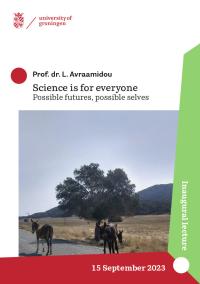Science is for everyone: Possible futures, possible selves
Synopsis
Who is a scientist? Who aspires to be a scientist? Who can be a scientist? In this inaugural lecture, I invite the audience to think about issues related to diversity and inclusion to science and explore the construct of “science identity”.
Science identity becomes valuable when exploring social and cultural aspects of scientific practice and science teaching and it is connected to goals related to equity, especially in terms of access to educational resources and opportunities to engage with science. Why? Because science is or has to be for everyone.
The term ‘possible selves’ is used to refer to the possibility of becoming scientifically literate and critically utilise scientific knowledge in our everyday lives. What do we eat? What do we wear? What we do with our bodies? What do we do with animals? What we do with plants? What we do with water? What we do with land?
The term ‘possible futures’ is used to refer to more sustainable and socially just futures, affected by developments in science, technology, and society as well as interactions between humans, non-humans, and more-than-humans: people, animals, plants, machines, and robots.
In imagining possible futures, healthier and more balanced relationships with our natural habitat as well as social environments are envisioned. Science education in general, and science identity in particular, play a crucial role in both imagining and shaping such futures.
Omslagontwerp en opmaak: LINE UP boek en media bv | Riëtte van Zwol
Alle illustraties, tenzij anders vermeld, zijn van de auteur.
Uitgegeven door University of Groningen Press
Broerstraat 4
9712 CP Groningen
https://ugp.rug.nl/
Downloads

Downloads
Published
Series
Categories
License

This work is licensed under a Creative Commons Attribution-NonCommercial-NoDerivatives 4.0 International License.



